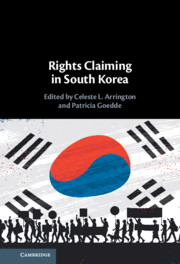Book contents
- Rights Claiming in South Korea
- Rights Claiming in South Korea
- Copyright page
- Dedication
- Contents
- Contributors
- Acknowledgments
- Abbreviations
- Introduction Rights in Action
- Part I Rights in Historical Perspective
- 1 Legal Disputes, Women’s Legal Voice, and Petitioning Rights in Late Joseon Korea
- 2 Defying Claims of Incompetence
- 3 “Equal” Second-Class Citizens
- Part II Institutional Mechanisms for Rights Claiming
- Part III Mobilizing Rights for the Marginalized
- Part IV Shaping Rights for New Citizens and Noncitizens
- Conclusion Findings and Future Directions
- Index
- References
3 - “Equal” Second-Class Citizens
Postcolonial Democracy and Women’s Rights in Post liberation South Korea
from Part I - Rights in Historical Perspective
Published online by Cambridge University Press: 17 April 2021
- Rights Claiming in South Korea
- Rights Claiming in South Korea
- Copyright page
- Dedication
- Contents
- Contributors
- Acknowledgments
- Abbreviations
- Introduction Rights in Action
- Part I Rights in Historical Perspective
- 1 Legal Disputes, Women’s Legal Voice, and Petitioning Rights in Late Joseon Korea
- 2 Defying Claims of Incompetence
- 3 “Equal” Second-Class Citizens
- Part II Institutional Mechanisms for Rights Claiming
- Part III Mobilizing Rights for the Marginalized
- Part IV Shaping Rights for New Citizens and Noncitizens
- Conclusion Findings and Future Directions
- Index
- References
Summary
Through an analysis of the codification of family law, this chapter argues that the process of institutionalizing democracy in South Korea created ambivalent legal bases for women’s rights. Amid the peninsula’s division, the occupation of the US Military Government, the onset of the Cold War, and the Korean War, South Korea began to institutionalize democracy before it could complete the process of decolonization. In the historical context of postcoloniality, women came to symbolize democracy and capitalism with the new Civil Code that remade women into full legal subjects with rights. Yet, women were also treated as the last remaining repositories of Korea’s “national tradition” in the legislative discussions that led to the promulgation of the new Civil Code. As a result, women’s rights were significantly compromised. This duality demonstrates key tensions in the conceptualization of equal rights in contexts of postcolonial democracy.
Keywords
- Type
- Chapter
- Information
- Rights Claiming in South Korea , pp. 63 - 82Publisher: Cambridge University PressPrint publication year: 2021

